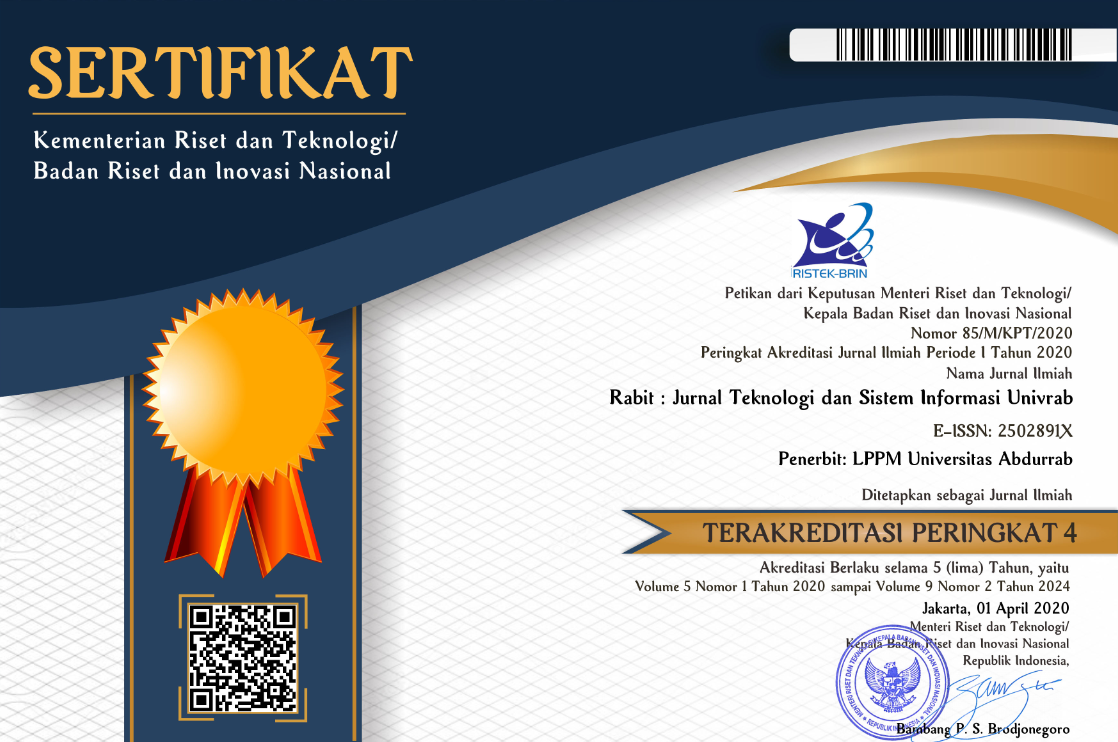INPLEMENTASI BUSINESS INTELLIGENCE DAN MARKET BASKET ANALYSIS UNTUK ANALISA DATA PENJULAN DI PT. ABC
Abstract
In the midst of the outbreak of the Covid-19 pandemic in 2020 in Indonesia, there was a change in the tendency of customer behavior to process shopping transactions, especially at minimarket outlets. With the implementation of physical distancing, customers are required to shop as effectively as possible to avoid accumulation in outlets. Company management must make a strategy to respond to changes in customer behavior. In this study, Business Intelligence and Market Basket Analysis methods were developed, namely Apriori to analyze customer behavior by analyzing sales transaction history. The results show that the Business Intelligence dashboard can display data in the form of graphs and tables, making it easier for users in the analysis process. In addition, the Association Rule using the Apriori method produces support and confidence values as a description of interrelated products, so that merchandising parties can easily make decisions. The results of the blackbox test show that the application developed can be accepted by the user because all user needs can be completed by the application
References
A. Hijriani, E. Aprilliana, R. I. A. Pribadi, and D. Sakethi, “Business Intelligence Dashboard (BID) Pada Usaha Mikro Bidang Retail Studi Kasus CV Duta Square Bandar Lampung,” Matrix J. Manaj. Teknol. dan Inform., vol. 10, no. 1, pp. 11–18, Mar. 2020.
N. Sari and S. Setiyowati, “Pengaruh Keragaman Produk Dan Kualitas Pelayanan Terhadap Kepuasan Konsumen Di PB Swalayan Metro,” Jul. 2017.
Zamroni, A. Widarko, and K. Abs, “e-Jurnal Riset Manajemen PRODI MANAJEMEN Pengaruh Harga, Lokasi dan Kualitas Layanan Terhadap Keputusan Pembelian pada Toko Komputer Cyber Mall Malang ( Studi Kasus Pada Konsumen Cyber Mall Malang),” Aug. 2020.
Ikrimah and T. D. Purwanto, “Business Intellingence Pada Sistem Informasi Monitoring Transaksi Penjualan Daya Beli Konsumen,” Bina Darma Conf. Comput. Sci., vol. 2, no. 1, pp. 9–21, 2020.
F. Panjaitan, A. Surahman, and T. D. Rosmalasari, “Analisis Market Basket Dengan Algoritma Hash-Based Pada Transaksi Penjualan (Studi Kasus: TB. Menara),” J. Teknol. dan Sist. Inf., vol. 1, no. 2, pp. 111–119, 2020.
dan Hadryan Eddy, “Analisa data transaksi penjualan barang menggunakan algoritme Apriori dan FP-Growth,” Apr. 2020.
N. Agustiani, D. Suhendro, W. Saputra, and S. Tunas Bangsa Pematangsiantar, “Penerapan Data Mining Metode Apriori Dalam Implementasi Penjualan Di Alfamart,” Pros. Semin. Nas. Ris. Dan Inf. Sci., vol. 2, no. 0, pp. 300–304, Jul. 2020.
H. Maulidiya and A. Jananto, “Asosiasi Data Mining Menggunakan Algoritma Apriori Dan Fpgrowth Sebagai Dasar Pertimbangan Penentuan Paket Sembako,” Proceeding SENDI_U, 2020.
A. Priyatna, “Implementasi Sistem Penunjang Keputusan Menggunakan Business Intelligence Untuk UMKM Di Gunung Putri Kab. Bogor,” J. Khatulistiwa Inform., vol. 7, no. 1, Jul. 2019.
F. C. Ningrum, D. Suherman, S. Aryanti, H. A. Prasetya, and A. Saifudin, “Pengujian Black Box pada Aplikasi Sistem Seleksi Sales Terbaik Menggunakan Teknik Equivalence Partitions,” vol. 4, no. 4, 2019

This work is licensed under a Creative Commons Attribution-NonCommercial-ShareAlike 4.0 International License.
Copyright Notice
The copyright of the received article shall be assigned to the publisher of the journal. The intended copyright includes the right to publish the article in various forms (including reprints). The journal maintains the publishing rights to published articles. Therefore, the author must submit a statement of the Copyright Transfer Agreement.*)
This work is licensed under a Creative Commons Attribution-NonCommercial-ShareAlike 4.0 International License.
In line with the license, authors and any users (readers and other researchers) are allowed to share and adapt the material only for non-commercial purposes. In addition, the material must be given appropriate credit, provided with a link to the license, and indicated if changes were made. If authors remix, transform or build upon the material, authors must distribute their contributions under the same license as the original.
Please find the rights and licenses in RABIT : Jurnal Teknologi dan Sistem Informasi Univrab. By submitting the article/manuscript of the article, the author(s) accept this policy.
1. License
The non-commercial use of the article will be governed by the Creative Commons Attribution license as currently displayed on Creative Commons Attribution-NonCommercial-ShareAlike 4.0 International License.
2. Author’s Warranties
The author warrants that the article is original, written by stated author(s), has not been published before, contains no unlawful statements, does not infringe the rights of others, is subject to copyright that is vested exclusively in the author and free of any third party rights, and that any necessary written permissions to quote from other sources have been obtained by the author(s).
3. User Rights
RABIT's spirit is to disseminate articles published are as free as possible. Under the Creative Commons license, RABIT permits users to copy, distribute, display, and perform the work for non-commercial purposes only. Users will also need to attribute authors and RABIT on distributing works in the journal.
4. Rights of Authors
Authors retain all their rights to the published works, such as (but not limited to) the following rights;
- Copyright and other proprietary rights relating to the article, such as patent rights,
- The right to use the substance of the article in own future works, including lectures and books,
- The right to reproduce the article for own purposes,
- The right to self-archive the article,
- The right to enter into separate, additional contractual arrangements for the non-exclusive distribution of the article's published version (e.g., post it to an institutional repository or publish it in a book), with an acknowledgment of its initial publication in this journal (RABIT : Jurnal Teknologi dan Sistem Informasi Univrab).
5. Co-Authorship
If the article was jointly prepared by other authors, any authors submitting the manuscript warrants that he/she has been authorized by all co-authors to be agreed on this copyright and license notice (agreement) on their behalf, and agrees to inform his/her co-authors of the terms of this policy. RABIT will not be held liable for anything that may arise due to the author(s) internal dispute. RABIT will only communicate with the corresponding author.
6. Royalties
This agreement entitles the author to no royalties or other fees. To such extent as legally permissible, the author waives his or her right to collect royalties relative to the article in respect of any use of the article by RABIT.
7. Miscellaneous
RABIT will publish the article (or have it published) in the journal if the article’s editorial process is successfully completed. RABIT's editors may modify the article to a style of punctuation, spelling, capitalization, referencing and usage that deems appropriate. The author acknowledges that the article may be published so that it will be publicly accessible and such access will be free of charge for the readers as mentioned in point 3.
 PDF (Bahasa Indonesia)
PDF (Bahasa Indonesia)
 Abstract views: 705
Abstract views: 705
 downloads: 507
downloads: 507

 :
:












